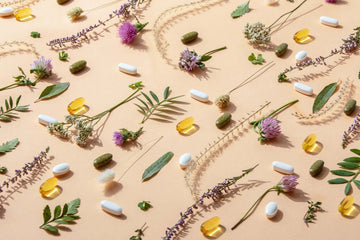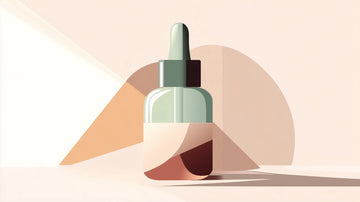During menopause, the drop in estrogen leads to major changes for the skin: collagen loss, pigment spots, dryness, and increased sensitivity. The bakuchiol, extracted from the plant Psoralea corylifolia, offers a gentle alternative to retinol to counter these effects. It helps reduce wrinkles, even out skin tone, and enhance skin firmness, without irritation or photosensitivity.
Key points:
- Anti-Aging Action: Stimulates collagen production and accelerates cell renewal.
- Sensitive skin: Well tolerated, without common side effects of retinol.
- Flexible routine: Usable morning and evening, even in the sun.
- Proven Effectiveness: Studies show an improvement in elasticity (+16%) and a reduction in pigment spots (-38%) after a few weeks.
Bakuchiol is ideal for menopausal skin thanks to its soothing, hydrating, and antioxidant properties. Easily integrate it into your routine for visible results in as little as 4 to 6 weeks.
Meet Bakuchiol, the Better Retinol Alternative for Sensitive Skin
Skin Changes During Menopause
During menopause, the skin undergoes significant transformations, primarily due to the marked decrease in estrogen levels. These hormonal fluctuations affect the health and appearance of the skin in several ways.
Loss of Collagen and Firmness
The decrease in estrogen accelerates collagen degradation, resulting in:
- Skin laxity, particularly in the neck area and along the jawline.
- An accentuation of wrinkles
- A reduction in skin elasticity
Brown Spots and Irregularities of the Complexion
Hormonal fluctuations stimulate the production of melanin, causing:
- The appearance of brown spots due to sun exposure
- The development of melasma (often called "pregnancy mask")
- Uneven pigmentation
- A duller and less even complexion
Sensitivity and Imperfections
With the decrease in estrogen levels, the skin's barrier function weakens, making it more reactive. Furthermore, 26% of women aged 40 to 49 experience episodes of late-onset acne.
Here are the main impacts:
| Change | Consequences |
|---|---|
| Weakened skin barrier | Skin more sensitive and reactive |
| Imbalanced sebum production | Oily or dry skin problems |
| Reduced hydration | Sensation of tightness and discomfort |
| Delayed healing | Marks and imperfections that last longer |
To address these challenges, solutions such as bakuchiol can target the mechanisms associated with skin aging during menopause.
Bakuchiol: A Natural Option to Replace Retinol
Bakuchiol, extracted from the plant Psoralea corylifolia (Babchi), stands out as a natural solution for skin issues related to menopause. Used for centuries in Ayurveda, it targets the main mechanisms of hormonal aging, offering an alternative to retinol particularly suited for mature skin.
Main Anti-Aging Effects
Bakuchiol effectively targets the skin concerns of menopausal skin. A study published in the British Journal of Dermatology in 2018 showed that a 0.5% concentration of bakuchiol, applied twice daily, was as effective as 0.5% retinol used once daily, but with significantly fewer side effects[1].
| Action | Benefit for Menopausal Skin |
|---|---|
| Acceleration of cell renewal | Reduction of wrinkles and fine lines |
| Reduction of melanin production | Attenuation of Pigmented Spots |
| Antioxidant effect | Protection against premature aging |
Benefits for Mature Skin
Bakuchiol offers valuable benefits for sensitive skin or skin affected by hormonal changes:
- No irritation: Unlike retinol, it is gentle on the skin.
- Constraint-free use: Can be applied morning and evening without risk of photosensitivity.
- Enhanced Hydration: Helps maintain good skin hydration.
- Soothing effect: Reduces irritations often observed during menopause.
As a natural alternative to retinol, bakuchiol easily fits into an anti-aging routine. Pair it with vitamin C or hyaluronic acid to maximize its benefits.
Comparison between Bakuchiol and Retinol
The previous sections highlighted the benefits of bakuchiol. But how does it compare to retinol, especially for menopausal skin? The choice between these two active ingredients is mainly based on their origin (plant-based for bakuchiol, synthetic for retinol) and their impact on the skin.
One of the strengths of bakuchiol is its stability in the face of light. Unlike retinol, which degrades in the sun and can make the skin more sensitive to UV rays, bakuchiol remains stable and can be applied at any time of the day. This makes it an interesting option for more reactive skin, such as that of menopausal women.
Key differences in practice:
| Criterion | Bakuchiol | Retinol | Menopausal Skin |
|---|---|---|---|
| Frequency of application | Up to two times per day | Once a day, in the evening | More flexibility |
| Sun sensitivity | None | Increased sensitivity | Simplified protection |
| Skin irritation | Weak to nonexistent | Possible, according to tolerance | More comfort |
| Hydration | Promotes hydration | May dry out | Better preserved hydration |
| Skin tolerance | Very well tolerated by sensitive skin | Requires gradual adaptation | Better suited for reactive skin |
| Anti-aging effectiveness | Comparable to retinol | Scientifically proven | Similar results |
For menopausal skin, bakuchiol offers specific benefits due to its soothing and antioxidant properties. It also helps to strengthen the skin’s protective barrier, which is a crucial aspect at a time when skin dryness becomes more frequent.
The effects of bakuchiol on collagen production and skin barrier health will be further explored in upcoming studies.
Studies on Bakuchiol During Menopause
Recent research shows interesting effects for menopausal skin:
Results on Skin Firmness
A study recorded the following data:
| Parameter | Improvement after 8 weeks (menopausal skin) |
|---|---|
| Skin elasticity | Plus 16% |
| Dermal density | +14 % |
These results were obtained through the nightly application of a serum containing 1% bakuchiol, measured using medical imaging[2].
Reduction of Pigment Spots
After 16 weeks of daily use of a 2% bakuchiol cream:
- A decrease in the melanin index of 38%
- A visible brightening in 87% of postmenopausal women[3]
Bakuchiol works by stimulating collagen production while inhibiting its degradation, which compensates for the effects associated with decreased estrogen levels[4].
To enhance its effectiveness, certain combinations are particularly efficient. For example, a formula combining 0.5% bakuchiol with niacinamide and alpha-arbutin has shown better results against pigmentation spots than bakuchiol used alone[5].
Using Bakuchiol in Your Routine
Daily Application Guide
Bakuchiol can be integrated into your morning and evening routine, which sets it apart from retinol. Here’s how to use it for menopausal skin:
The morning :
- Mild cleaner
- Bakuchiol Serum (0.5-1%)
- Moisturizing cream
- Sun protection
The evening :
- Double cleansing
- Bakuchiol Serum
- Nourishing cream
| Introduction Phase | Recommended Frequency |
|---|---|
| Weeks 1-2 | Every other evening |
| Weeks 3-4 | Every night |
| After 1 month | Morning and evening if tolerated |
Tips for Choosing Your Product
When choosing a bakuchiol product for menopausal skin, here are some points to consider:
- Concentration: Look for a concentration of 0.5 to 1% for effective results.
- Formulation: Favor lightweight textures such as serums or oils.
-
Additional ingredients:
- Hyaluronic acid
- Niacinamide
- Peptides
- Packaging: Prefer opaque bottles with an anti-air system to preserve the product's stability.
Research indicates that regular use for 12 weeks can visibly improve skin texture, wrinkles, and pigment spots. Effects on hydration and texture may be noticeable after 4 to 6 weeks.
Laboratoires üma offers an anti-aging serum containing 0.5% bakuchiol, specifically designed to meet the needs of menopausal skin. Its opaque bottle protects the formula, which effectively targets collagen loss and pigment spots.
By following these recommendations and incorporating bakuchiol into your routine, you can better manage skin changes associated with menopause.
Complete Skin Care During Menopause
In addition to skin care applied directly to the skin, integrating an approach that combines nutrition and complementary ingredients can enhance the effects of bakuchiol.
Nutritional Support
To maximize the benefits of bakuchiol, an appropriate nutritional intake plays a key role. Laboratoires üma offers supplements specially designed to meet the needs of menopausal women:
- Harmonie Daily®: This product targets 48 symptoms related to menopause, with 94% of users reporting positive effects as early as the first month[1].
These supplements, rich in collagen and antioxidants, work deeply to support the skin's structure, while bakuchiol acts on the surface.
Associated Ingredients
To enhance the effectiveness of bakuchiol, some ingredients can be integrated into the routine:
- Céramides: They help protect the skin barrier and reduce moisture loss.
- Peptides: Contribute to improving the firmness and elasticity of the skin.
These combinations allow you to simultaneously address issues such as loss of firmness, dehydration, and uneven skin tone, often accentuated during menopause.
Conclusion
Bakuchiol establishes itself as a natural option to support women facing skin changes related to menopause. It offers results comparable to those of retinol, while being better tolerated. After 12 weeks of regular use, notable improvements are observed in the firmness of the skin, wrinkles, and pigmented spots.
As mentioned in the Soin Complet de la Peau section, combining bakuchiol with hydrating ingredients such as hyaluronic acid enhances its benefits. The addition of antioxidants can also optimize its anti-aging effects, allowing one to easily tailor a skincare routine to their needs.
To maintain these results, it is recommended to apply it regularly for 12 weeks, while using daily sun protection and specific treatments. By incorporating the supplements mentioned above, this routine helps preserve skin health during menopause, while remaining suitable for sensitive skin.






